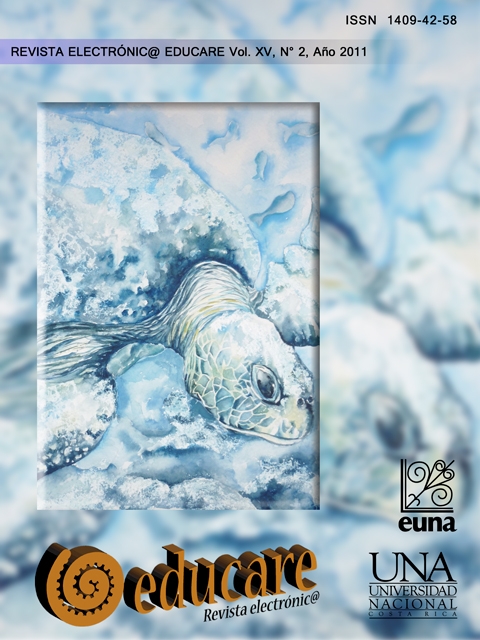Methodological Rigor in the Curricular Evaluation
DOI:
https://doi.org/10.15359/ree.15-2.3Keywords:
Methodological rigor, object to be evaluated, role and ethics of the evaluatorAbstract
This essay develops the importance of the methodological rigor in a curricular evaluation. The assessment of the curricular evaluation by the interested parties has to show the assessor’s rigor with which the process has been realized, in this way it is possible to demonstrate elements that make the evaluation valid, reliable and creditable. The rigor of the evaluation is sustained with the articulation of aspects that are significant, assessable, theoretical, and methodological, of participation of the actors and of ethics which allow delimiting and developing the object to be evaluated. Therefore, each of these aspects is an essential part of the way to continue in an evaluative process.
References
Carrión, C. (2001). Valores y principios para evaluar la educación. México: Paidós.
De Alba, A. (1991). Evaluación curricular. Conformación conceptual del campo. México:
Universidad Nacional Autónoma de México.
Gurdián, A. (2007). El paradigma cualitativo en la investigación socio-educativa (Colección
IDER, CECC, AECI). San José, Costa Rica: PrintCenter.
Picado, M. (2006). Un acercamiento a la evaluación cualitativa. San José, Costa Rica. EUCR.
Shaw, I. (2003). La evaluación cualitativa. Introducción a los métodos cualitativos. Barcelona,
España: Paidós.
Downloads
Published
How to Cite
Issue
Section
License
1. In case the submitted paper is accepted for publication, the author(s) FREELY, COSTLESS, EXCLUSIVELY AND FOR AN INDEFINITE TERM transfer copyrights and patrimonial rights to Universidad Nacional (UNA, Costa Rica). For more details check the Originality Statement and Copyright Transfer Agreement
2. REUTILIZATION RIGHTS: UNA authorizes authors to use, for any purpose (among them selfarchiving or autoarchiving) and to publish in the Internet in any electronic site, the paper´'s final version, both approved and published (post print), as long as it is done with a non commercial purpose, does not generate derivates without previous consentment and recognizes both publisher's name and authorship.
3. The submission and possible publication of the paper in the Educare Electronic Journal is ruled by the Journal’s editorial policies, the institutional rules of Universidad Nacional and the laws of the Republic of Costa Rica. Additionally, any possible difference of opinion or future dispute shall be settled in accordance with the mechanisms of Alternative Dispute Resolution and the Costa Rican Jurisdiction.
4. In all cases, it is understood that the opinions issued are those of the authors and do not necessarily reflect the position and opinion of Educare, CIDE or Universidad Nacional, Costa Rica. It is also understood that, in the exercise of academic freedom, the authors have carried out a rogorous scientific-academic process of research, reflection and argumentation thar lays within the thematic scope of interest of the Journal.
5. The papers published by Educare Electronic Journal use a Creative Commons License:














 The articles published by Educare Electronic Journal can be shared with a Creative Commons License:
The articles published by Educare Electronic Journal can be shared with a Creative Commons License: 



